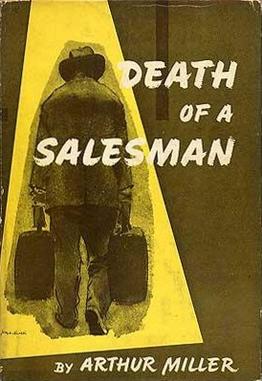In Death of a salesman the playwright has been able to present a common man’s tragedy in front of us. As far as Miller is concerned an average man is the apt subject for a tragedy. It depicts the fate and the final ending of a common man in an ordinary environment. This play belongs to the category of a typical tragedy and settle tears at a lower level of pathos and indeed evokes sympathy and tears instead of exaltation of mind. Still, the play could ale to conceive slight comic relief in some parts. The play brings several moments of confusion because of a mobile concurrency of past and present. It was first titled as ‘Inside of his head’ as the major actions are already happened long back, Willy recollects everything. So, the fusion of past and present constitute certain confusion.
The action of the play takes place largely inside the Loman home in Brooklyn, but other places in New York and Boston are used as well, including hotel rooms, Willy’s office, a restaurant, and Willy’s gravesite. The play is grounded in realism, which means that it depicts realistically what happens in the lives of its characters, but it also contains elements of expressionism, specifically when it depicts imaginary sequences (dream) and portrays for the audience the inner workings of the characters’ minds and their emotions. The play is largely a representation of what takes place in the mind of Willy Loman during the last two days of his life.
There is a homophonic pun in the name of Willy Loman (low man). He recalls about past events and imagines situations, and the audience is able to see his thoughts played out on the stage. The reminiscences and imaginary sequences allow the audience to understand the characters’ inner thoughts and provide insight into his behavior during the present day scenes. For example, the audience learns, during one such reminiscence, that Biff has been tormented for since he was a young child by the discovery that his father had an extramarital affair This insight helps the audience for better understanding both Willy and Biff, explains some of Biff’s anger toward his father, and indicates why he is so disillusioned.
Miller originally titled the play The Inside of His Head, which illustrates that he intended to show the audience what happens in a man’s mind when his dreams are never realized, and when he lives in a world based on illusion. Miller’s method of flashing back and forth between the past and the present, and between the imaginary and the realistic, allows the audience to witness how a lifetime of disappointment, delusion, and failure have led to the current situation, and shows facets of each character that would not have been revealed if only the present-day occurrences had been portrayed. Because of the way the play is constructed, the audience can see what the characters have become and what experiences, thoughts, and emotions led them to their present state.
When Miller wrote the play he had the classical tragedy in his mind. He had always wanted to produce something intellectually artistic. Despite his self-consciousness, Miller comes very near to achieving success in his aim. He presents a modern tragic hero, yet it can legitimate even in the classical sense.
